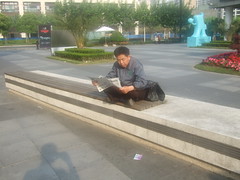The man who reads nothing at all is better educated than the man who reads nothing but newspapers, stated Thomas Jefferson.
What would Jefferson think of social media?
Might his words be stemmed in part from the competitive fight for journalistic integrity and the battle over print and digital media?
You only need to read Mitch Joel’s perspective […]
—
Thank you for reading! If you enjoyed this, please consider following more tips by RSS or email delivery.
More: Twitter | FriendFeed | Email | Cell: 617-780-5299
 The man who reads nothing at all is better educated than the man who reads nothing but newspapers, stated Thomas Jefferson.
The man who reads nothing at all is better educated than the man who reads nothing but newspapers, stated Thomas Jefferson.
What would Jefferson think of social media?
Might his words be stemmed in part from the competitive fight for journalistic integrity and the battle over print and digital media?
You only need to read Mitch Joel’s perspective from last December on the end of mass media:
Instead of looking forward to a brand new year of hope and opportunity, it looks like mass media is about to face mass destruction. Not from a content or audience perspective, but from a need to really look into their own mirror and decide who, exactly, they want to be in a world where the term “media fragmentation” is passed around far too easily without bearing the serious consequence of those two simple words, and advertising dollars are going to have to be divided amongst many more players than any of them ever imagined.
Don’t fret, though. Change is in the air.
Richie Escovedo writes about a recent plan to merge editorial content between the Dallas Morning News and the Fort Worth Star-Telegram:
A shift needed to happen in order for both newspapers to continue to be an influential voice in their respective markets moving forward….By combining efforts through specific collaboration, the two newspapers should find themselves more agile and of more use to their communities.
The same can be said in the state of Washington, where four newspaper staffs engaged in an unprecedented form of collaborative journalism–using Twitter, web links, and connecting people who’d never met in person–to use social media to publish the news.
I read newspapers infrequently. I follow the news in my web browser, by RSS feeds, or through social networking sites; never in printed newspapers. If something is important for me to know, enough people will tell me.
I suppose that’s how Jefferson got his news, too.
And then some:
The basis of our government being the opinion of the people, the very first object should be to keep that right; and were it left to me to decide whether we should have a government without newspapers or newspapers without a government, I should not hesitate a moment to prefer the latter.
Deep thoughts by Thomas Jefferson.
What do you think?
Photo credit: Kongharald
—
Thank you for reading! If you enjoyed this, please consider following more tips by RSS or email delivery.
More: Twitter | FriendFeed | Email | Cell: 617-780-5299






